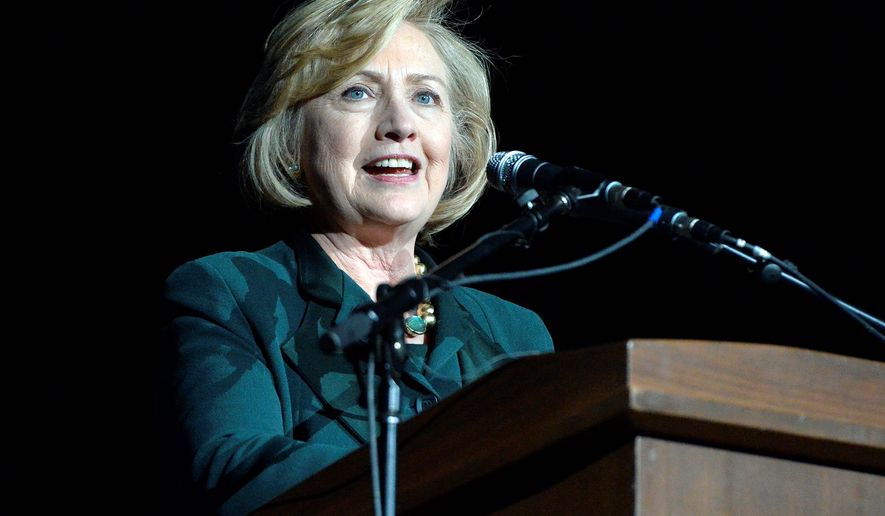Progressives have adopted a “wait and see” attitude toward Hillary Rodham Clinton’s presidential campaign after the former secretary of state’s latest attempt to transform herself into a populist champion ended with a thud.
Mrs. Clinton recently was forced to backtrack after she declared that businesses don’t create jobs in America — a comment widely interpreted as an effort to tap into the excitement around Sen. Elizabeth Warren, the Massachusetts Democrat who has cultivated a cult following on the left with her little guy vs. Wall Street pitch.
Mrs. Clinton’s explanation — she now says she was merely criticizing tax breaks for corporations that ship jobs overseas — did little to blunt attacks from Republicans, but it also raised fresh questions about whether the former first lady is capable of waving the banner for progressive populism or if she’ll wilt at the first sign of a backlash.
Analysts say the Democratic presidential primary largely will hinge on which candidate best embodies the populist sentiment bubbling to the surface in American politics and captures the passion of voters who believe the system is rigged against the 99 percent.
At this point, Mrs. Warren, who recently seemed to crack the door to a White House bid, clearly delivers that message better than anyone. But if she declines to run for president, the jury is out on whether Mrs. Clinton can effectively carry the mantle.
“Folks are wary of her closeness to Wall Street. There’s a wait-and-see approach,” said Neil Sroka, communications director at the liberal PAC Democracy for America. “She said months ago that if you were going to run for president you have to run on an idea, that is an essential quality of running. If she decides that idea is the fight against income inequality, then I have no doubt she will run a strong, compelling, forceful campaign on it. But she has to make that decision.”
While Mrs. Clinton and her husband, former President Bill Clinton, undoubtedly are part of the Democratic Party establishment, the former first lady seems to have decided that a populist platform is key to capturing her party’s nomination.
On the stump in Massachusetts on Oct. 24, Mrs. Clinton struck a Warren-esque note with a sharp critique of the business community, perhaps an attempt to distance herself from Wall Street.
“Don’t let anybody tell you that, you know, it’s corporations and businesses that create jobs,” she said at a rally for Massachusetts gubernatorial candidate Martha Coakley.
Within days, however, she backtracked and claimed she “shorthanded” her position.
“Our economy grows when businesses and entrepreneurs create good-paying jobs here in an America where workers and families are empowered to build from the bottom up and the middle out, not when we hand out tax breaks for corporations that outsource jobs or stash their profits overseas,” she explained.
Progressives fear the incident offered a preview of how Mrs. Clinton will run her 2016 presidential campaign.
“The small outcry that emerged if the reaction to that is, ’oh, well we’re going to stop campaigning on income inequality issues despite it being the most important issue of the 2016 election.’ I think that will speak volumes,” Mr. Sroka said.
By contrast, it seems clear Mrs. Warren will not back down from her populist stance. She continues to take aim at Wall Street and to push for liberal priorities such as an expansion of Social Security benefits and student-loan reform.
The freshman senator also has been a rock star on the campaign trail, arguably the most in-demand Democrat this cycle.
Mrs. Warren argues Democrats across the country, including those with White House ambitions, should embrace her message and not back down when hit with criticism.
“When I go to what are called red states, purple states and blue states talking about these key issues That’s what excites people everywhere. I can’t emphasize this enough. These are not just issues that occur in blue states,” she said over the weekend on a conference call hosted by the Progressive Change Campaign Committee (PCCC), an emerging political force on the left and the biggest champion of the so-called “Warren wing” of the Democratic party.
“These are American issues and Americans across the country care about these issues,” Mrs. Warren added. “It’s our job to get out there and fight for them.”
Many progressives seem to believe that Mrs. Clinton’s surest path to victory in 2016 — and the most effective way to ward off a potential primary challenge from the left — is to sound as much like Mrs. Warren as possible.
“The single-best way for Hillary Clinton to excite voters is to embrace Elizabeth Warren’s populist agenda of reforming Wall Street, reducing student debt, and expanding Social Security benefits. Hillary Clinton has hopefully recognized that adopting Elizabeth Warren’s message is a smart general election strategy,” Adam Green, PCCC co-founder, said last week. “Elizabeth Warren is the most sought-after campaigner for Democrats nationwide this year for a reason — Warren’s economic populist agenda is the pathway to success for Democrats in 2014 and 2016.”
• Ben Wolfgang can be reached at bwolfgang@washingtontimes.com.




Please read our comment policy before commenting.